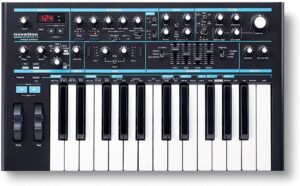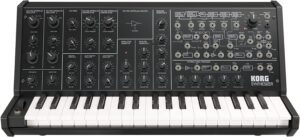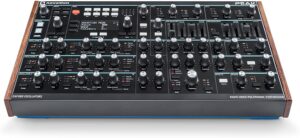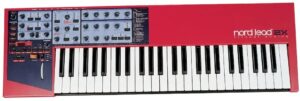Are you looking for the best synth for psytrance? In this short article, we will help you make an informed buying decision.
Psychedelic trance which keyboardists refer to as ‘psytrance,’ is an ‘electronic dance music’ subgenre distinctively identified by its layers of melodies and rhythms. As a unique subcategory of trance music, psytrance is best suited for dancing as the music style furnishes excellent flexibility in rhythm and tempo. To create psytrance tunes, you’ll need to be a seasoned keyboardist with remarkable mastery in layering different tunes and melodies.
Additionally, you’ll require a high-quality, versatile synthesizer for creating and curating psytrance melodies. Strictly speaking, there’s no tailor-made or custom-built synth for improvising psytrance tunes. Instead, you’ll need to pay close attention to the specific sound you’re looking to accomplish, synth components for achieving your sound (filters, LFOs, wavetable, etc.), and synth plug-ins.
Eventually, it all comes down to your personal preferences while shopping for the proper synth for psytrance.
The 4 Best Psytrance Synthesizers
| Image | Model | Price |
|---|---|---|
 | Novation Bass Station II Analog Mono-Synth (Top Pick) | Check Price |
 | Korg MS20 Mini Semi-Modular Analog Synthesizer (Close Runner-Up) | Check Price |
 | Novation Peak Desktop Polyphonic Synthesizer | Check Price |
 | Nord Lead 2X Synthesizer | Check Price |
Novation Bass Station II Analog Mono Synth (Editor’s Choice)
The Bass Station II Analog Mono Synthesizer from Novation comes across as the perfect electronic keyboard for producing bass notes. At the same time, the Bass Station II is ideal for kicking out crunchy arpeggios, crisp triads, and bright psytrance. The all-new Bass Station II features a thoroughly refurbished and updated layout but retains the versatile features of the original.
The Bass Station II, in its latest avatar, comes equipped with better filters, enhanced effects and modulation, and much more. The signal path of the Bass Station is all analog, including the effects section, and the onboard hardware comes as discrete components in the form of knobs, sliders, and switches. In addition, you can archive and curate your recorded patches on Bass Station II for replaying whenever you wish to.
Novation Bass Station II Analog Mono Synthesizer is equipped with 64 versatile presets and sufficient storage. At the same time, you can record and store 64 additional signature and curated sounds in the included librarian software. Furthermore, the critical system comprises full-scale velocity-sensitive keys along with the added functionality of designable after-touch.
The filter mechanism lets you create your sweet spots-push the distortion to make it snarl with fury or bask in the warmth of mellowed tones. The Bass Station II synth comes with multiple controls, including but not limited to ‘oscillators,’ ‘mixer,’ ‘filters,’ and ‘arpeggiator,’ offering you endless possibilities for crafting fresh tunes. As a class-compliant synthesizer, Bass Station II can be hooked up with anything that comes with a USB connector.
You can even pair an exterior instrument for operating it via the unit’s analog filter and effects.
Pros
- Integrated pattern-based arpeggiator and step sequencer with 32 distinct rhythms presets
- MIDI I/O on 5-pin DIN connectors for connecting MIDI equipment
- Many patches have been created by Bass Station II artists (Jason Miles, Adam Freeland) to present an immersive soundtrack
- Full latitude for distorting LFO waveforms through the LFO Slew functionalities
Cons
- The keys feel somewhat flimsy
Korg MS20 Mini-Series Modular Analog Synthesizer (Close Runner-Up)
Introduced in 1978, the Korg MS20 Mini-Series Modular Analog Synthesizer continues to be a highly sought-after keyboard even after 42 years. Discernible keyboardists heap accolades on the MS-20 owing to its flexible patching options, celebrated analog filter, and full-bodied sound.
The IMS-SMSiPad app and Korg’s MS-20 plug-in synth have enabled more than 300,000 individuals to immerse themselves in the inimitable MS20 sounds from the original.
Those vintage sounds intrinsic to MS20 have been repurposed and upgraded for syncing with the latest avatar of the original. In addition, technicians tasked with designing the first MS20 have skillfully remodeled its circuitry for smooth installation inside the MS20 Mini-86% smaller in size.
The brand new MS20 Mini, which retains the retro-vintage look of the introductory synth, will tantalize you with its stunning analog sounds.
Just like the original, the state-of-the-art MS20 Mini-Series Modular Analog Synthesizer will hugely impress keyboardists thanks to its receptive keys and pads. The succulent and thick basses and the riveting lead tones that outpours will leave you mesmerized.
The all-new MS-20 features two oscillators and two VCFs (voice control filter), two VCAs (voice-controlled amplifier), a noise generator, and several other fine-tunable components.
Pros
- Replicates the performance of the original synth in a smaller package
- The external signal processor (ESP) for exploiting an external audio source’s volume or pitch for better synth control
- Self-oscillating low-pass/high-pass filters with exclusive distortion mechanism
- USB-MIDI connector and MIDI IN jack (for receiving and sending out note memos
Cons
- The keys are more suited for working with smaller fingers
Novation Peak 8-Voice Desktop Polyphonic Synthesizer
Keyboards players go overboard in extolling the virtues of the Novation Peak 8-Voice Desktop Polyphonic Synthesizer, kicking out warm sounds peppered with grimy piercing overdrive.
The Peak 8-Voice Desktop Polyphonic Synthesizer comes reinforced with three new oscillators for each of the eight voices. At the same time, this Novation Synth features three distinct distortion points all through the analog signal chain and a booming multimodal analog filter per voice.
The oscillators of Peak take inspiration from Novation’s Bass Station II, sounding thoroughly analog by being topnotch ‘Numerically-Controlled Oscillators’ (NCO). But the Peak has the edge over the Bass Station II in that the former comes with 60 digital wavetables.
The technique of wavetable synthesis allows storage of electronic sound specimens collected from various sources that can be transformed, combined, or fine-tuned for sound reproduction.
Peak’s modulation system enables you to create and tweak completely novel sounds from the ground up. The modulation panel allows you to instantly access frequently used patches straight away from the main controls with the added benefit of exploiting derivative ‘via’ arrangements by tweaking some menu keys.
Another handy feature that you can make good use of is the ‘Wavetable Editor,’ letting you let loose the versatility of the Wavetable oscillators.
Featuring a Live Edit function with drawing tools, the wavetable editor allows you to develop customized oscillator shapes and analyze them beforehand in real-time. In addition, importable audio enables the loading of your creations for using them as oscillator waveforms.
Peak’s 8-Voice Polyphonic Synth is connectible with your PC or Mac (via USB) and MIDI gear (through MIDI I/O on 5-pin DIN connectors). And oh yes, the Peak plugs into your modular equipment through the modulation input.
Pros
- Components software lets you store near-unlimited patches on your computer
- Make the most of the arpeggiator and guitar effects such as reverb, chorus, and delay
- Instantly transform your patches for live gigs simply by touching two animate knobs
- Spontaneous sound editing and patch designing using the 16 direct assignments and the 16-slot modulation array
Cons
- Taking advantage of all the features and functionalities after going through an 8-page on a small display can be challenging.
Nord Lead 2X Synthesizer
The Nord Lead 2X and the Nord Rack 2X, the rackmount synth model, retain all the integral features of the original-the Nord Lead launched in 1995. The Lead 2X Synthesizer features the very first’s Lead’s intuitive and user-friendly interface as well as the instrument’s unmistakable sound. On the other hand, the Nord Lead 2X is integrated with plenty of new features, including 20 voices polyphony for creating layered sounds.
Nord Lead 2X is further reinforced with extra-large internal memory storing plenty of user programs, preset programs, user performances, and present performances. Smartly and compactly designed, the Lead 2X is a versatile synth ideal for studio production and live concerts.
Pros
- Features 4 x 99 user programs, 4 x 10 user percussion kits, 100 user performances plus 3 x 100 preset performances, and 6 x 99 factory programs
- 20 voices polyphony for crafting resounding bass, fantastic leads, beefy pads, and layered sounds
- Excellent sound refinement owing to the lucid 24-bit DACs sprinting at 96kHz
Cons
- The keys feel a tad delicate and feeble
FAQ About the Best Synthesizers for Psychedelic Trance
How to Pick the Right Synthesizer?
Navigating the synth market to choose a product that caters to your needs and preferences can be tax given the sheer variety available. Should you go for analog, digital, apps, modular, vintage, perambulator, emulator, or other new-fangled designs? You’ll come across such a wide variety of synthesizers that you could be spoilt for choice.
To make the demanding the task of zeroing on the proper synth somewhat easier for you, we sifted through several brands and models to create this buying guide. All you need to do to choose your appropriate synth is to go through the following tips:-
Should You Go Digital or Analog?
Should you go digital for keeping up with the Joneses, or should you take the analog route? Choosing a digital synthesizer offers you excellent flexibility and latitude when it comes to replicating almost infinite tunes and melodies. In addition, digital models specialize in reproducing the soundscapes of a range of musical instruments quite effectively.
On the other hand, if you decide to buy an analog synth, you’ll have the benefit of exploring charming pads, sizzling strings, ripping leads, and huge basses. However, you’ll have to keep one caveat in mind, and that is to avoid getting ensnared in the never-ending debate on whether analog or digital is better. Or else you’ll always be in a dilemma.
Should You Opt for Hardware or Software Option?
This is arguably the most crucial factor that you’ll have to consider while shopping for an ideal synth. Of course, going hard comes at a price (and a steep price at that), but you can stay rest assured it’ll be a worthwhile investment. As with most other things, there’s nothing comparable to the feeling of touching and handling the synth with your hands.
Alternatively, going soft comes cheaper (and more often free) without sacrificing or compromising the quality of sound. Also, take into account the advantage of having sonic integration at your fingertips through DAW or MIDI. Nevertheless, the fact remains that going online is simply no match for the tactile experience of dealing with hardware components.
Brand New or Used?
It does not need to be emphasized that choosing a brand new product is far better than settling for a second-hand model. Buying a new synth offers you peace of mind as you know it’ll at least for a few years. Then you have the warranty along with the after-sales service to fall back on.
Choose a used model, and you always run the risk of eventually spending much more than what you’d for a new synth.
Package Deal or Modular System?
An all-in-one synthesizer has everything going for it, implying that you can practically start using it out of the box. Or you can design your tailored system comprised of modules or discrete components. Depending on the modus-operandi of your design, you can end up breaking the bank or stay within your budget.
High-End or Pocket-Friendly Clones?
Buying a vintage Roland, Korg, or Yamaha could cost you a fortune, but the chances are that your investment will keep paying you off for a lifetime. However you, always have the option of selecting clones duplicated in hardware or software (and sometimes both) forms.
So, The Best Synth for Psychedelic Trance Tones Is…
Cutting to the chase belting out psychedelic trance notes has more to do with mastering the playing style than selecting a suitable synth. You’ll come across a diverse variety of synthesizers with plug-ins and add-on effects that’ll let you create your desired psytrance tones. Nevertheless, pay close attention to aspects like easy-to-use features and control panel functions before you decide.
Our choice for psychedelic trance music is The Bass Station II Analog Mono Synthesizer. It’s the best synthesizer for psytrance available on the market at the moment.